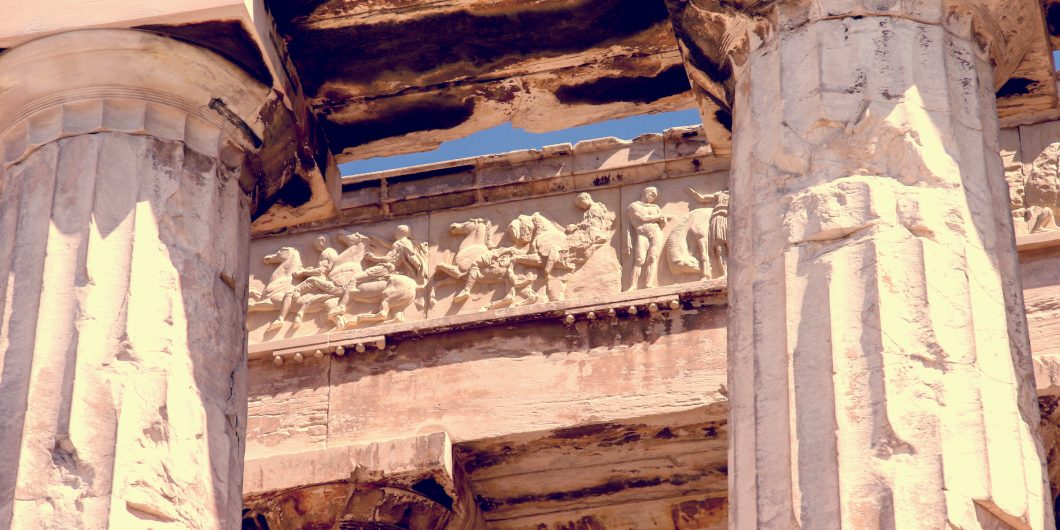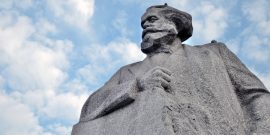Dickens’ and de Tocqueville’s travels in 19th century America still provide a guide for understanding today’s divisive politics.
Pierre Manent and the Recovery of the Republican Spirit
In his thoughtful and lucid “Preface” to the French political philosopher Pierre Manent’s essay-booklet The Tragedy of the Republic, Patrick J. Deneen rightly emphasizes the multiple ways in which Manent has taken aim at “the modern temptation to empty the public arena of the essential activity of politics.” For Manent, politics entails “putting reasons and actions in common,” that is words and deeds together, in the remarkably suggestive words of Aristotle, the first and greatest political scientist in the Western tradition. It is the unending search for and articulation of the common good, and not agonistic and theatrical self-presentation and civic participation à la Hannah Arendt, or an undue and one-sided emphasis on conflict and enmity à la Carl Schmitt. Without in any way being insensitive to the genuine achievements of the liberal order, Manent notes, in Deneen’s helpful formulation, that “a golden thread in modern political thinking and practice has been the effort to eliminate finally the need for politics, either through the temptations of totalitarianism, technocracy, or economism.” While avoiding didacticism, Manent’s thought and scholarship involves a two-fold effort to restore both the inescapable dialectic of truth and liberty, and the “perpetual need to develop the virtues of prudence, wisdom, and moderation as the main tools of political engagement.”
The Tragedy of the Republic originated as the first of an ongoing series of public lectures in honor of René Girard, the distinguished Franco-American social theorist, culture critic, and theorist of “mimetic desire.” Delivered in French at Sciences Po in Paris, this formidable essay was translated by Ralph C. Hancock and originally appeared in First Things. It has recently been republished in the “Wiseblood Essays in Contemporary Culture” series from Wiseblood Books, an excellent Catholic boutique publisher specializing in the intersection of literature, religion, and social reflection faithful to broadly classical and Christian wisdom. Manent’s essay, at once weighty and accessible, is worthy of sustained reflection and fully merits republication.
For Manent, the “republic” in the original sense, is anything but passive, and demands action at the service of la chose publique, the commonwealth or “public thing.” It is irreducibly “aristocratic” in the sense that men of talent and virtue aim to emulate each other in service to the common good. Honorable ambition is put at the service of the self-governing city. But it is also egalitarian since action informed by reason and virtue is made possible by the political realm itself, marked by “ruling and being ruled in turn,” as Aristotle aptly put it. It ultimately serves, and is made possible by, a good that is truly common. To be sure, modern republicanism is representative in character, and thus political life takes on a much more indirect character than in the classical variant. But republicanism in any form demands action informed by moral virtue and practical reason, and not merely the articulation and defense of rights and interests, however necessary and legitimate they may be in their own sphere. Manent observes that the great modern republics, England of the 17th and 18th centuries, “a republic disguised under the form of monarchy” as Montesquieu called it in The Spirit of the Laws, America of the Founding-era (“an extraordinary founding,” Manent himself calls it), and even the France of 1789 followed by “the adventure of the Empire,” were admirable expressions of political action and energy, of “emulation” among civic equals.
But modern republics, and this is coextensive with the “tragedy” that confronts them, have largely severed freedom from action informed by practical reason and civic and moral virtue. Democratic theory, as it is called in the academy, imagines liberty without command and obedience without authority; a city without citizens and states without statesmen. In this sense, the decayed modern republic knows neither civic equality nor virtuous emulation. We thus no longer know how to grasp what Manent calls “the moral bases of a truly republican regime.” For a long time, the liberal commercial republic enriched and energized modern Western societies. It created a free and prosperous civil society, and a formidable state that knew how to govern. But our “reigning social philosophy”—liberalism or the ideology of human rights—mistakenly postulated that a “spontaneous social order…would bring together order and freedom without the mediation of political rule.” Over time, this was to “abandon society to its inertia, that is, its corruption” since such a social order forgets the meaning of political rule and the citizenship and statesmanship that takes “pride in ruling for the common good.” It is not a question of statism or collectivism, as some classical liberals and libertarians mistakenly think, but rather the self-government that animates, energizes, and renews a truly free society. As Manent laconically puts it, even representative republics need to be governed and well governed at that. The distinctions between authority and authoritarianism, statesmanship and tyrannical self-assertion, are at the core of free and civilized human life. To conflate these pairs, to efface these differences, is to do great damage to the political character of human existence.
…authentic republican heroism depends on a “more than human blending of pride and humility.” In this weaving together of noble action and speech which rallies all the resources of the soul, in this unforced melding of “magnanimity and moderation,” lies true human greatness.
To illustrate the republic in its original pre-representative form, Manent turns to Shakespeare’s Roman plays, so indebted to Plutarch and through whose dramatic form the “motives of the actors of that republican regime which left the deepest mark on the history of Europe and the West” vividly come to life. Shakespeare’s Coriolanus, Manent shows, reveals a Rome that is political through and through: “the city is the beginning and the end of all the actions of all the characters.” The popular class and their tribunes are perfectly willing to honor the aristocratic greatness of the warrior hero Coriolanus; they do not object in principle to being governed by the best. But Coriolanus takes his pride, the legitimate principle of the aristocratic Roman republican regime, “to the point of insolence and furor.” He refuses to show his wounds to the people, or to find the words, any words, to accompany his heroic deeds. Where the plebeians demand respect in a mixed regime, Coriolanus can only offer them “condescension and sarcasm” since “he is incapable of speaking humanely or calmly to members of the popular class.” Coriolanus is the exemplar par excellence of magnanimity without moderation. He is finally not a political man since he desires to be Roman Consul without the approval of his fellow citizens. Corialanus does not aim to be a tyrant but by going beyond politics he, like tyrants ancient and modern, undermines the vital preconditions of political liberty. He does not know how to “put reasons and actions in common” in Aristotle’s inimitable words.
Manent suggestively compares him with modern statesmen who were also “great citizen(s),” namely Lincoln and de Gaulle. These two great statesmen fully appreciated that “the test of the republic lies in the almost impossible task of joining speech to deed and deed to speech, each to each aptly and justly.” The eloquence, “rarity,” and “brevity” of Lincoln’s Gettysburg Address, that noble testament to those who gave “the last full measure of devotion” so a political order, “conceived in liberty,” and “dedicated to the proposition that all men are created equal” could survive and experience a “new birth of freedom,” testifies to statesmanship at the service of human freedom. De Gaulle’s lucid call on June 18, 1940 for his compatriots to rally behind him to defend the liberty, honor, and independence of France, even after the Nazi conquest of the homeland, crystallizes every sentiment of noble or honorable resistance. As Manent puts it elsewhere, authentic republican heroism depends on a “more than human blending of pride and humility.” In this weaving together of noble action and speech which rallies all the resources of the soul, in this unforced melding of “magnanimity and moderation,” lies true human greatness. Such greatness transcends democratic categories and conventions even as it elevates democracy through the sheer fact of being itself.
Manent’s treatment of Shakespeare’s Julius Caesar is equally insightful. I will allow the reader the pleasure of making his way through both Manent’s and Shakespeare’s texts. But let me highlight a few particularly evocative points that Manent makes along the way. Manent shows how apolitical the Stoic Brutus’s virtue really is: he cares far more about appearing virtuous than in doing what is necessary to root out Caesar’s despotism and to revivify the Roman Republic. In particular, he resists Cassius’s suggestion that the conspirators kill Marc Antony, too, since his survival surely means the survival of Caesarism. Manent also respectfully but firmly resists René Girard’s suggestion that Cassius, the true “initiator” of the conspiracy against Julius Caesar, the one who “pushes against all the others,” is first and foremost a “mediator of hate.” Manent suggests that Girard’s interpretation of the play is far too apolitical and fails to recognize “that there are noble and base hatreds.” As Manent writes, “a very honorable and moral tradition, one, I must emphasize, that is Christian as well as pagan, holds that hatred for the tyrant is a noble hatred, and that it belongs to the virtue of the good citizen.” As Manent argues in his autobiographical book of interviews Seeing Things Politically, Girard is wrong to believe that “all political situations come down to the same situation.” Girard sees only undifferentiated violence where there remain meaningful moral and political distinctions. Girard’s anthropology of the human condition risks giving rise to passivity and civic indifference, all in the name of a misunderstanding of both Christianity and political life.
Let us return to Patrick Deneen’s accurate evocation of the centrality of the cardinal virtues for Manent’s vision of thought and action. For Manent, action is never an end in itself but must always be guided by the virtues. As Manent argues in his recently published book Natural Law and Human Rights, there is such a thing as “right action, whose declensions are courage, justice, prudence, and temperance—in brief, action that takes on its form and color according to the catalogues of virtues.” Here Manent channels and renews core insights of Aristotle, Cicero, and St. Thomas and perhaps Tocqueville, too. We moderns must recover an understanding of “commanding action” which is always “the commandment of right action” guided by right reason. Such action initiates and commands, but is never merely arbitrary. It is action informed by practical reason and the cardinal virtues. Deneen gets one thing wrong in his admirable “Preface” to Manent’s essay: Manent does not envision a new republic, or a rejection of liberal institutions. Rather, he wants to reinvigorate those institutions by recovering a true understanding of the wellsprings of thought and action. This is a tall order, indeed, but perhaps the most promising way out of our ever-deepening modern crisis. As Wilson Carey McWilliams (a teacher and scholar esteemed by both Deneen and myself) once wrote, one of the preeminent tasks today for all those who love truth and civilization is to “bring old gods to a new city.” That injunction perfectly describes Manent’s project as I understand it.



